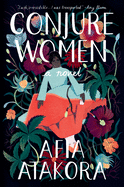
| Publisher: | Random House | |
| Genre: | Women, General, Literary, Fiction, Historical, African American | |
| ISBN: | 9780525511489 | |
| Pub Date: | April 2020 | |
| Price: | $27 |
| Starred | Fiction |
by Afia Atakora
In Conjure Women, a debut novel, Afia Atakora has created a vivid picture of African American life in the decades immediately before and after emancipation. Two years after the end of the American Civil War, Rue works as a midwife and healer on the plantation where she was once enslaved. The close-knit, quiet community strives to avoid having the outside world notice that the white family that owned the land and the now-ruined mansion is gone. But everything begins to change when one of the women gives birth to a pale child with strange black eyes, "like little black-eyed beans," for which he is named.
Although Rue is shocked by the sight of him, she feels bound to him, "a secret retribution for a long-ago crime, the punishment she had been dreading." In chapters looking back to the times of slavery and war, when Rue learned her healing talents from her mother, May Belle, who also dealt in curses, the network of secrets that underlies Rue's life slowly becomes known to readers. In the Reconstruction era chapters, when illness sweeps the plantation, it becomes clear those secrets may soon destroy the fragile peace that Rue has found.
The hints of supernatural retribution and the heart-wrenching depictions of love and suffering will remind readers of Toni Morrison's work. Rue's determination to protect the people who mean the most to her, including Bean, and the devastating mistakes she makes along the way will leave readers eager for more by Atakora. --Kristen Allen-Vogel, information services librarian at Dayton Metro Library
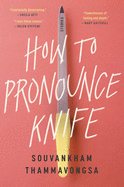
| Publisher: | Little, Brown | |
| Genre: | Cultural Heritage, Short Stories (single author), Literary, Asian American, Fiction | |
| ISBN: | 9780316422130 | |
| Pub Date: | April 2020 | |
| Price: | $26 |
| Fiction |
by Souvankham Thammavongsa
In How to Pronounce Knife, poet Souyankham Thammavongsa's first story collection, immigrant and refugee characters who find themselves divorced from familiar surroundings struggle to find a place for themselves economically, socially and existentially. In the title story, a girl tries to adapt to an illogical school system while sensing the tension rising in her own family. "Slingshot" tells the story of a 70-year-old woman who begins an affair with a much younger man after the death of her husband. A young woman recounts the sometimes joyful but often painful memories of her mother in "Edge of the World," and another girl faces her own coming of age in dual worlds, one of boys and school dances and another of menial labor with her determined mother, in "Picking Worms."
With spare, precise prose, Thammavongsa evokes a world of strong emotion made livable by painful, unstable social constraints. The syntactical simplicity of the writing throws the internal complexity of these characters and their situations into stark relief, displaying how restraint can pack an unexpectedly sentimental punch. Quietly poetic, How to Pronounce Knife also produces a shivering recognition in its readers. Whether portraying a jilted bus driver, a former boxer-turned-pedicurist or a daughter desperate to make a connection with her mother, these stories capture the heart-wrenching desperation, love and desire that connects them all. And while these 14 tales are structured around each character's specific experience, they come together as pieces in a larger, universal puzzle to depict the basic human desire "not to be alone in the dark." --Alice Martin, freelance writer and editor

| Publisher: | Catapult | |
| Genre: | Women, Small Town & Rural, Literary, Coming of Age, Fiction | |
| ISBN: | 9781948226486 | |
| Pub Date: | March 2020 | |
| Price: | $26 |
| Starred | Fiction |
by Chelsea Bieker
There's no shortage of potential stumbling blocks for an author commandeering a 14-year-old narrator. The miracle of Chelsea Bieker's Godshot, then, is not just that Bieker masters young Lacey May's voice, but that she makes every moment of Lacey's unbelievable life feel crisp, raw and deeply, achingly real. And Lacey does not have a simple story. She lives in the California town of Peaches, where drought has destroyed the raisins her neighbors rely on. Sprouting up instead is a cult led by the grotesque Pastor Vern, who considers himself a modern messiah and promises to bring back the rain through "assignments" to his church members. Sheltered Lacey is one of his targets, and she falls under his spell shortly after her mother disappears with a man she met through a nearby phone-sex business. Desperate to find her mother--and growing into motherhood herself--Lacey decides to investigate the women who run this business, in the hope of bringing her family together again.
Godshot is a monumental exploration of faith, family and what it means to be a woman in a strange, cruel, wondrous world. It is also filled with the sort of imagery that will haunt readers for weeks afterward: baptisms in bathtubs filled with soda; "God glitter" sprinkling down from a church ceiling; a horde of taxidermy critters dressed in handsewn outfits; the "glassy dark blue worlds" in an infant's eyes. Bieker has pulled off a stunning debut, revealing a deep-rooted talent that will, no doubt, bear more fruit. --Lauren Puckett, freelance writer
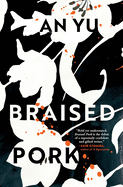
| Publisher: | Grove Press | |
| Genre: | Cultural Heritage, Family Life, City Life, Literary, Marriage & Divorce, Fiction | |
| ISBN: | 9780802148711 | |
| Pub Date: | April 2020 | |
| Price: | $25 |
| Fiction |
by An Yu
In the first scene of An Yu's Braised Pork, Jia Jia opens her bathroom door and discovers that her husband, Chen Hang, has drowned himself in their tub. From that point to the final, dreamlike subaquatic scene of this poignant debut novel, water is both life-giving and a fearful void. Her husband left behind nothing but a crude sketch of a creature with a fish body and a man's head. Weeks earlier, on one of his infrequent calls to her while away on business in Tibet, he told her he had dreamt of a creature that was "barely a man" with the body of a fish. He never mentioned it again, and the sketch holds no clues. The fish-man becomes a touchstone as Jia Jia questions her place in the world.
Chen Hang's suicide upends Jia Jia's place in Beijing's patriarchal society. Although she veers between grief, embarrassment and anger, she prides herself on controlling her emotions. Strong feelings, nonetheless, emerge in her subconscious. She experiences dreams where water runs through her bedroom; it eventually "churned and threatened to sink everything in its path." She sees a silver fish and, although it bears no resemblance to her husband's sketch, dives under the water and swims with it. Jia Jia's attempts at empowerment combine with the quest for the meaning of her husband's sketch, and this takes her out of Beijing city to rural Tibet, where Chen Hang had his disturbing dream.
An Yu's first novel is a moving, magical parable about a young woman's journey of self-discovery and agency. --Cindy Pauldine, bookseller, the river's end bookstore, Oswego, N.Y.
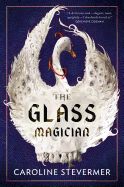
| Publisher: | Tor | |
| Genre: | Gaslamp, Fantasy, Fiction, Historical, Romantic | |
| ISBN: | 9780765335043 | |
| Pub Date: | April 2020 | |
| Price: | $26.99 |
| Fiction |
by Caroline Stevermer
In the well-imagined historical fantasy The Glass Magician, magic is both real and manufactured. Traders are both human and animal. Friends are both loyal and deceitful. Nothing is quite what it seems, but the stakes are high and the truth behind the tricks must be revealed.
Caroline Stevermer's 1905 New York City is populated by a stratified society dictated by magic and colonialism. Thalia Cutler, orphaned professional stage magician, has always thought herself to be a Solitaire, the magic-less and largest group. Everything changes, though, when Talia "Trades" into a swan during a trick gone wrong, loses her job due to an underhanded non-compete clause and gains a monstrous stalker. Then, her lifelong stage manager is framed for murder and her life is thrown completely upside down. Soon Thalia is working to find new employment, master her magic and solve a mystery all while grappling with the truth of her identity, kept secret from her since birth.
Stevermer (The Alchemist) weaves together the mundane and the fantastical as Thalia reveals the truth behind the illusions she doesn't control and uses those she does to free herself and those she loves best. The narrative builds slowly, with Stevermer thoroughly setting the scene before piling on threats and encounters that build to a crescendo comprised of both kinds of magic. Readers who wish to look behind the curtain will be swept up in the drama of costumes, props and showmanship, while fantasy readers will appreciate the world-building. The Glass Magician will satisfy those who like their stories slow, immersive and full of secrets and hidden depths. --Suzanne Krohn, editor, Love in Panels
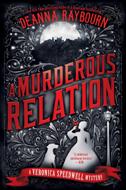
| Publisher: | Berkley Books | |
| Genre: | Mystery & Detective, Historical - Victorian, Romance, Fiction, Historical, Women Sleuths | |
| ISBN: | 9780451490742 | |
| Pub Date: | March 2020 | |
| Price: | $26 |
| Mystery & Thriller |
by Deanna Raybourn
In A Murderous Relation by Deanna Raybourn (the Lady Julia Grey mysteries; A Dangerous Collaboration), Veronica Speedwell is a thoroughly independent woman. She sells butterflies to collectors to fund her expeditions and follows a strict set of rules for the gentlemen she takes to her bed while abroad (Rule #1: No Englishmen). Veronica teams up again with her partner-in-crime, Stoker--Lord Revelstoke Templeton-Vane, a former navy doctor who was scarred physically and romantically on his adventures abroad and who wrestles with the demons of being recognized as legitimate but not biologically a Templeton-Vane. Together they aim to solve a mystery that weaves through London society, from the most titled to those most at risk.
In this wild fifth installment of their escapades, the orphaned adventuress has some surprisingly royal family connections ask her to retrieve a foolhardy gift that could bring scandal to the monarchy. Meanwhile, Stoker calls upon his family to enable the two of them to attend a party where, inevitably, murder and mayhem ensue.
Set against the backdrop of 1880s London and the terror of the most infamous serial killer, the dynamic plot thickens as Veronica and Stoker not only have to procure a priceless treasure, determine which disguised informant to trust and avoid being kidnapped or killed--they also have their mutual growing attraction and libidinous urges to contend with.
Many behind-the-scenes machinations, both helpful and threatening, provide direction and impediments as the duo use their powers of observation, their fighting skills and their insatiable curiosity to prove whether or not a member of the royal family is actually Jack the Ripper. --BrocheAroe Fabian, owner, River Dog Book Co.
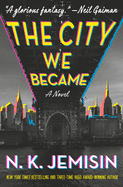
| Publisher: | Orbit | |
| Genre: | Magical Realism, Fantasy, Contemporary, City Life, Literary, Fiction, Action & Adventure | |
| ISBN: | 9780316509848 | |
| Pub Date: | March 2020 | |
| Price: | $28 |
| Science Fiction & Fantasy |
by N.K. Jemisin
After making history as the first writer to win the Hugo Award for best novel three years in a row for her Broken Earth trilogy, N.K. Jemisin kicks off another ambitious trilogy with The City We Became, an urban fantasy that transforms New York City into a multiversal battleground. The author has written a paean to a much-celebrated metropolis, though it is far from an uncomplicated portrait. The supernatural threats facing her protagonists often piggyback on some of the very real challenges facing the city, from racist policing to gentrification. The City We Became is about New York fighting for its life in more ways than one.
In Jemisin's novel, "great cities are like any other living things, being born and maturing and wearying and dying in their turn." The City We Became is about New York City giving birth to itself, becoming a "living, thinking entity shaped like a big-ass city." The city is vulnerable in the process, necessitating the help of human avatars it imbues with the power of each of the five boroughs. When something goes wrong with the city's birth, the avatars--Jemisin's protagonists--must learn to wield the city's strength against an otherworldly entity bent on its destruction.
The novel's imaginatively realized battles against Lovecraftian evil exist alongside Jemisin's interpretation of New York City, which is bound to both raise hackles and inspire recognition among New Yorkers. The City We Became is a fierce, opinionated vision of a storied metropolis facing down existential threats. --Hank Stephenson, manuscript reader, the Sun magazine
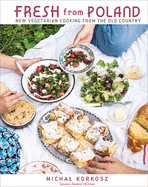
| Publisher: | The Experiment | |
| Genre: | Cooking, Polish, Vegetables, Vegetarian, Regional & Ethnic, Specific Ingredients | |
| ISBN: | 9781615196555 | |
| Pub Date: | March 2020 | |
| Price: | $19.95 |
| Food & Wine |
by Michał Korkosz
In 2017, Michał Korkosz became the first Polish winner of a Saveur award. And now Korkosz has created a gorgeous paean to the cooking of his home country in Fresh from Poland: New Vegetarian Cooking from the Old Country. When the average person thinks "Polish cuisine," traditional, heavy, meat-based meals like kielbasa and schnitzel probably come to mind. But Korkosz showcases a different side. Korkosz's Polish food brims with vegetables and fresh flavors (although there is still a fair amount of butter and flour in the recipes that he's adapted from his mother and grandmother). As Korkosz himself says, "I do not avoid butter, honey, gluten, or techniques that enhance taste and sensation."
Gorgeously photographed and well-laid out, Fresh from Poland is a truly beautiful cookbook. The sections include Breads and Baked Goods, Main Dishes, and Preserves, Jams, and Pickles, and dishes that will surprise even the most jaded of palates.
Concoctions range from simple kanapka, sweet and savory open-faced sandwiches, to more elaborate meals like Pierogi z kaszą gryczaną, bryndzą i mięta (pierogi with buckwheat, sheep's milk cheese and mint). Fresh From Poland is full of recipes that will engage everyone from beginning home cooks to experienced chefs. The dessert section is particularly mouthwatering, and will leave readers dreaming of Heaven Cake and Angel Wings. Fresh from Poland is a welcome addition to the cookbook library of anyone looking to expand their recipe repertoire, not just vegetarians. --Jessica Howard, bookseller at Bookmans, Tucson, Ariz.
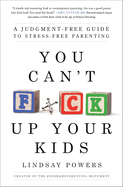
| Publisher: | Atria | |
| Genre: | Family & Relationships, Parenting, Marriage & Family, Health & Fitness, Pregnancy & Childbirth, Motherhood, Topic, Humor | |
| ISBN: | 9781982110130 | |
| Pub Date: | March 2020 | |
| Price: | $16.99 |
| Health & Medicine |
by Lindsay Powers
The title of Lindsay Powers's parenting book You Can't F*ck Up Your Kids: A Judgment-Free Guide to Stress-Free Parenting might be a little misleading. You can, after all, "f*ck up your kids" (according to Powers, by smoking while pregnant, skipping vaccines and neglecting, abusing or starving your children). And anything that promises truly "stress-free" parenting should probably be viewed with a hint of skepticism. Title aside, however, Powers's book is a powerful one, reminding anxious parents that, "loving, feeding, and housing your child will lead them to become a happy and healthy person."
During her tenure as editor-in-chief of Yahoo! Parenting, Powers saw first-hand the ways today's "hyper-connected world" could manipulate parents' "worst fears and neuroses," resulting in stressed-out adults desperate to find the perfect way to parent their precious children. But her experience as a mother of two, along with a comprehensive review of existing research, suggested that the decisions parents worry about the most (e.g., breastfeeding vs. formula, daycare vs. a stay-at-home parent, sleep training vs. co-sleeping) are often the ones least likely to matter in the long run.
There is no shortage of how-to parenting books promising the perfect solution to whatever challenges your kids throw your way: not sleeping, refusing to eat vegetables, biting other toddlers, overdosing on screen time. You Can't F*ck Up Your Kids doesn't offer answers to such specific questions (though Powers does include high-level overviews of the research around each issue, along with many others). Instead, it serves as both a reminder and invitation to slow down, stress less and remind yourself that you're doing the best you can--and that's ultimately what matters most to the little ones in your life. --Kerry McHugh, blogger at Entomology of a Bookworm
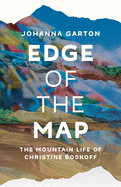
| Publisher: | Mountaineers Books | |
| Genre: | Biography & Autobiography, Adventurers & Explorers, Sports & Recreation, Mountaineering, Sports | |
| ISBN: | 9781680512885 | |
| Pub Date: | February 2020 | |
| Price: | $19.95 |
| Art & Photography |
by Johanna Garton
When chapter one is entitled "Missing," the gut-clenching starts early. Those who follow mountaineering are likely all too familiar with world-renowned alpinist Christine Boskoff, who left a successful career at Lockheed Martin at almost 30, a latecomer to climbing, and rocketed to the top of the sport. Humble and driven, Boskoff is the only American woman to have summited six 8,000-meter peaks.
In Edge of the Map, Johanna Garton (Awakening East) lovingly takes over her journalist mother's efforts to write a book about Boskoff, derailed by Parkinson's disease. She depicts the themes that ran through Boskoff's life: battling the odds, surviving loss and grief, and pursuing dreams.
The climbing community is a close-knit and often tragic one. Boskoff's path is filled with examples that give rise to the adage "If you can't handle death, you shouldn't be in the business of climbing." She and her husband, Keith, took over legend Scott Fischer's Mountain Madness following Fischer's death in the 1996 Everest catastrophe (the subject of Jon Krakauer's Into Thin Air). Boskoff ran the international guide service alone after Keith's death, and turned it into a highly successful venture. She unexpectedly found late love and a new climbing partner in the renowned Charlie Fowler; the two later disappeared while climbing in China in 2006.
Garton excels at creating and maintaining interest and tension even when the reader knows the tragic ending. From the unlikely climber's childhood to the trek to bring Boskoff home, Garton captivates readers with an engaging narrative style that gives them a taste of the summit. --Lauren O'Brien of Malcolm Avenue Review
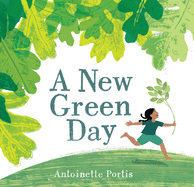
| Publisher: | Neal Porter/Holiday House | |
| Genre: | Questions & Answers, Concepts, Games & Activities, Science & Nature, General (See Also Headings Under Animals or Technology), Seasons, Juvenile Nonfiction | |
| ISBN: | 9780823444885 | |
| Pub Date: | April 2020 | |
| Price: | $18.99 |
| Starred | Children's & Young Adult |
by Antoinette Portis
From dawn to dark in this ever-so-satisfying picture book from the creator of Hey, Water! and Now, readers are treated to a series of poetically posed riddles which offer an evocative exploration of the sights and sounds, touches and smells a girl experiences one summer day.
"Morning lays me on your pillow,/ an invitation, square and warm./ Come out and play!" These first lines beckon readers to turn the page to find out who or what is speaking: sunlight. And, just like that, a pattern is established. Next up is snail asking the girl to "read all about my/ nighttime travels." A leaf follows and implores her to "follow my roads/ and climb." Inchworm, tadpole and pebble make appearances before rain moves in, accompanied by lightning and "the rumble/ in the stomach of the storm" that is thunder. Shadow gives way to darkness, "a black coat/ slipped around/ Earth's shoulders," and a satisfying experience culminates in that "engine/ of the summer dark," as cricket, the "engine of the summer dark" thrums in the "new green day" of tomorrow.
Portis's digitally finished illustrations use brush, ink, leaf prints and charcoal with hand-stamped lettering. She poses her riddles in square swatches of color, using an earth-toned palette that echoes the pale yellow of sunlight through a window, the green of an inchworm, the deep blue-gray of a stormy sky. In its reverence for each finely described detail, A New Green Day holds a magnifying glass to the wonders, big and small, that are waiting in nature for all to enjoy. --Lynn Becker, blogger and host of Book Talk, a monthly online discussion of children's books for SCBWI
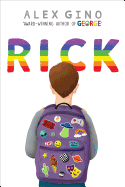
| Publisher: | Scholastic Press | |
| Genre: | Friendship, Emotions & Feelings, Social Themes, Juvenile Fiction, LGBT | |
| ISBN: | 9781338048100 | |
| Pub Date: | April 2020 | |
| Price: | $17.99 |
| Children's & Young Adult |
by Alex Gino
In Rick, fans of Alex Gino's debut novel, George, get to reacquaint themselves with many of the book's characters, who are now entering middle school. Gino once again takes on issues being discussed in society at large and places them front and center in their characters' world, so young readers can examine the ideas in accessible, tangible ways.
Here Rick, whom readers met in George as the best friend of Jeff (who is still a bully but humanized somewhat in this book, through Rick's eyes) grapples with his sexual attraction, or lack thereof. While others seem to be attracted to boys or girls, Rick feels no attraction at all. When he learns about an after-school club called Rainbow Spectrum for LGBTQIAP+ rights, it starts him thinking ("Sometimes Rick wondered whether he was gay because he had never had a crush on a girl. But he had never had a crush on a boy either, so how could he be gay?"). Rick joins the club, but keeps it secret from Jeff.
Through Rick's exploration, Gino raises other essential questions: What does it mean to be a friend? What if standing up for your beliefs means losing a friend? Rick confides in his grandfather--one of the most moving relationships in the book--and also befriends Melissa, whom Jeff bullied in the past. Gino once again acknowledges the complexities of growing up and encourages readers to keep it simple: Be who you are. --Jennifer M. Brown, senior editor, Shelf Awareness
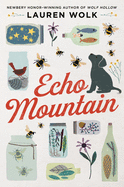
| Publisher: | Dutton | |
| Genre: | Country Life, United States - 20th Century, Lifestyles, Girls & Women, Juvenile Fiction, Historical | |
| ISBN: | 9780525555568 | |
| Pub Date: | April 2020 | |
| Price: | $17.99 |
| Children's & Young Adult |
by Lauren Wolk
Twelve-year-old Ellie searches the wilderness for something that will save her comatose father in this intricate, coming-of-age novel set in Depression-era Maine.
Ellie's family has had a hard time adjusting to their new life on Echo Mountain following the stock market crash. Though Mother and Ellie's older sister, Esther, miss life in town, Daddy, who lost his tailoring business, took to the wilderness, loving the freedom and outdoors. But that was before his accident. Now he's in a coma, and Ellie and her family have been caring for him for months. Ellie, who has been blamed by her family for the accident, sets out to heal him, trying every remedy she can think of. As her desperation grows, Ellie decides to seek out the "hag" who lives up the mountain. Though no one knows much about her, Ellie knows she has healed her father before and believes she might be able to do so again.
Echo Mountain by Lauren Wolk (Wolf Hollow) features a plucky and intuitive girl finding her place. Wolk's characters are memorable: the hag, Cate, is delightful, spirited and highly intelligent; Ellie's interactions with the mysterious, woodcarving boy Larkin are charming. The relationships among characters are nuanced and fascinating, allowing various facets of their personalities to come to life depending on who else is in the scene. Wolk's remarkable use of memory allows for Ellie's recollections to burst forth without confusing readers or slowing the narrative. Echo Mountain is a beautiful look at multi-generational friendship and the power of working together. --Kyla Paterno, freelance reviewer